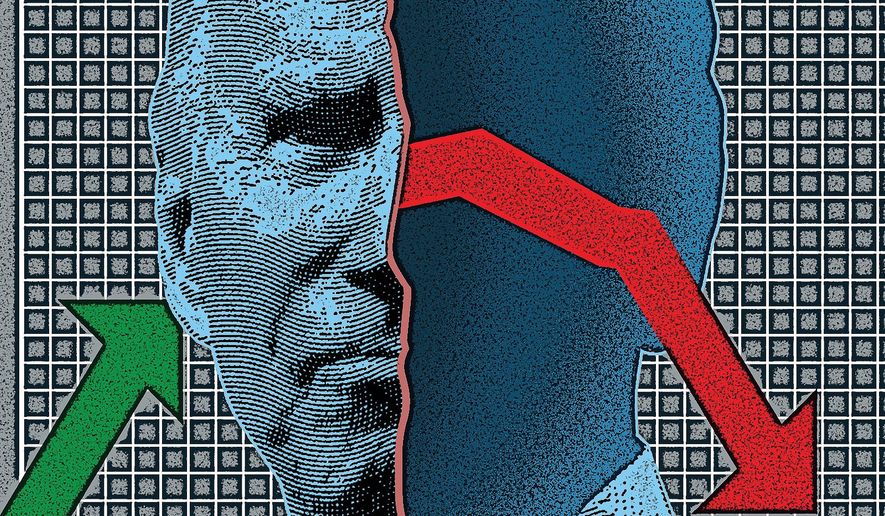OPINION:
As President Biden enters his second year, the American economy faces tough challenges that his woke policies have either ignored or aggravated.
The economic recovery has taken a double hit from the delta variant and now omicron. Supply chain problems, empty downtown offices, inflation and frustrations with masks and shutdowns are seemingly permanent.
The efficiencies associated with just-in-time management, globalization and reliance on Chinese export subsidies to keep down prices for everyday items have created a brittle and vulnerable system.
Bottlenecks plaguing importers will not end quickly, nor will chip shortages. Imported furniture and domestically produced cars will remain scarce and supply pressures on inflation acute.
It’s not all the container ships backed up at Long Beach harbor.
School lunch and breakfast programs are coping with shortages of staples from soups to pizza. As consumers shifted food purchases at restaurants and from food services to grocery stores, food companies could not adjust product configurations smoothly.
To simplify production and maximize volumes on store shelves, they cut out some items. For example, in October, Campbell told school food services that the company was cutting out several sizes of thermal canned soup.
Empty spaces at grocery stores abound, and most of the items in short supply are not imported. Rather, frustrations reflect labor shortages and labor unrest the Biden Administration has done little to abate.
For example, the scarcity of breakfast cereals was the direct effect of a strike that was lengthened when radicalized Kellogg workers turned down a contract negotiated by their union — they got lots of encouragement from Mr. Biden.
Longer-term, American industry faces an existential crisis — Japan, Taiwan, India, the EU, South Korea and China are pouring billions into the semiconductor industry. All recognize that manufacturing is the mainspring of innovation.
For example, the electric car is a mechanically simpler device than automobiles powered by internal combustion engines. A big battery atop two electric motors has fewer components than an ICE and transmission. But it is an engineering marvel to produce the batteries and incredible software that manages the power supplies and distributes the horsepower and torque to four wheels.
For decades, American, Japanese and European automakers have been several steps ahead of Chinese competitors in ignition systems, crankshafts and the like.
China’s industrial policymakers bet on leap-frogging Western automakers through mastery of EV battery design with import barriers that reserved the domestic market for national champion Contemporary Amperex Technology, Ltd., generous subsidies, and securing global supplies of lithium and cobalt.
Bosch, the world’s largest automotive supplier renowned for its ICE ignition systems, won’t make EV batteries. Instead, it will cooperate with CATL, which is building a massive factory in Germany.
Meanwhile, GM relies on its joint venture with Korea’s LG, but together they appear puzzled to produce an EV that won’t catch fire parked in your driveway.
Tesla is exporting cars with Chinese-made batteries to Europe, a dozen indigenous Chinese automakers are testing the European market, and China is building capacity that could flood our market as well.
The royalties and profits that fund new product development, university research and mechanical and software engineering jobs will flow to whichever country wins out in assembling vehicles and manufacturing critical components. Batteries account for about 40 percent of EV value.
Already, the United Autoworkers is shorting U.S. automaking by wagering its organizing budget on university workers and graduate teaching assistants. Those now account for one-quarter, or 100,000, of the union’s membership.
Mr. Biden’s most important industrial policy initiative, the $250 billion U.S. Innovation and Competition Act, has passed the Senate. Still, it languishes in the House because the president and Speaker Nancy Pelosi have other priorities.
They are putting all their energy into an aggressive buildout of the entitlements state — refundable Child Tax Credit, subsidized pre-K and child care, paid family leave and welfare for friendly journalists.
All that is an extension of how the president thinks about the economy. A great big pie whose size he can take for granted, but it’s not so big as he thinks.
The Biden prosperity is based on huge federal deficits, foreign borrowing and the Federal Reserve recklessly printing money to purchase many of the new bonds the Treasury issues.
The upshot is a debased dollar — inflation running at historical levels and consumers expecting a lot more of it — and a U.S. trade deficit careening towards new records.
It’s a bit like the graduate school scam of students borrowing hundreds of thousands of dollars for worthless degrees.
Mr. Biden borrows for a grand woke party for social justice through welfare on steroids, while the American economy hollows out.
• Peter Morici is an economist and emeritus business professor at the University of Maryland and a national columnist.




Please read our comment policy before commenting.